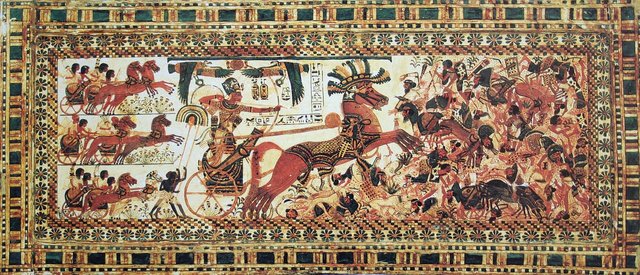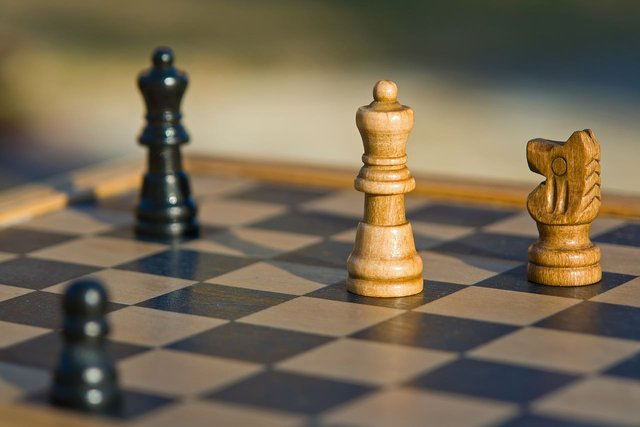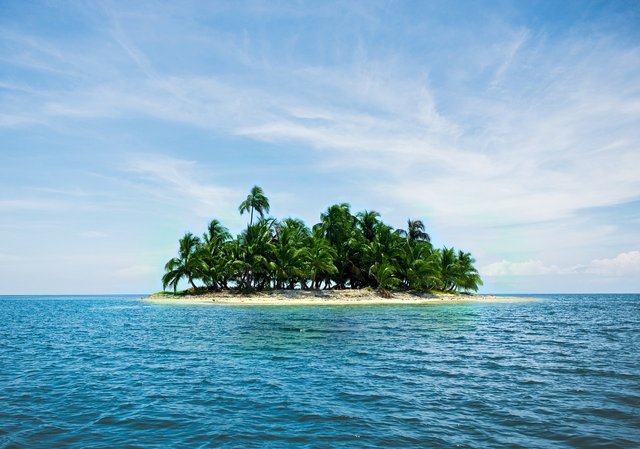What is 'Privilege'? Where Does it Come From?
I began to hear the term "invisible backpack of white male privilege" in the 1990s. As I understood it then it was an effort to raise awareness about the fact that white, male Americans start off on better footing than women and minorities. That seemed like a positive effort. We could all stand to be more aware of our advantages.
However as the years went on, with that concept established in the public psyche, what came next was the weaponization of it. Basically that if you're part of a privileged group, you don't get to have an opinion about matters of race, class, sexuality or gender. You have to be quiet, listen to critical theorists and internalize what they tell you.
I had a problem with this, even then. I grew up being told that we lived in an egalitarian society, and that this meant fairness. But critical theorists have a special definition of fairness which they say is informed by historical atrocities, such as the transatlantic slave trade.
Did you know most American college students believe that slavery was an American invention? That it never existed before in history until white European settlers came up with it, and that it ended when abolished by the North following the civil war?
That doesn't surprise me, because that was the only education I ever received about the history of slavery. 100% of the blame was placed on European colonialists, including the American subset of that group. We were never taught that in fact, slavery was widely practiced by native Africans before any European ever set foot there. That in fact, European slave traders bought their slaves from native African slave traders.
It's also the case that slavery was not as widespread in the US as most college students believe. At the peak of American slavery, only 4.9% of Americans owned slaves. It was a practice reserved for the wealthy, and not nearly as commonplace as slave ownership was in say, ancient Rome or Egypt.
This does not justify it obviously, but it begins to raise the question of why 100% of blame is placed on European colonialists. Especially when you factor in that slavery was practiced around the world throughout history, by every culture, until American abolitionists put a stop to it.
Nobody in all of history has done more to forcibly put a stop to slavery, around the world. No other culture in history fought to free their own slaves, voluntarily, and for moral reasons. So why are we the focus of 100% of blame for all slavery ever to occur? Why do US college students emerge from their history courses wrongly believing that slavery is a white, American invention?
I would wager that it's because if you accused Saudi Arabia of utilizing slave labor, which they do in the present day, they would either deny it or acknowledge it with a shrug. Likewise with other parts of the middle east, India, Africa and China. You cannot use guilt to get what you want from people who don't feel guilty.
White Americans however are in love with guilt. I suspect that's mostly attributable to their multi-century Christian background and the Christian focus on critical self-examination. Guilt has become a status symbol and a way to communicate to your peers that you're a compassionate person.
But besides being very easily made to feel guilty, white Americans are also very wealthy. That's a critical connection to understand. If you are a member of a group that has been thoroughly dominated by another group, and you cannot overcome them by violent means, you will look for other ways to get what you want from them. An achilles heel, if there is one to be found. In this case, it's guilt.
Guilt is in large part why the US is the #1 most generous giver of aid in the world. Where do you suppose most of that aid goes to? How long have we been giving so generously, and will it ever be enough?
But I digress. Slavery is the main reason furnished by critical theorists as to why equality should not mean across the board fairness for all groups. Their contention is that the historical crimes of white males in particular mean that we are excluded from that standard of fairness and will have to accept a great many handicaps under the new system.
Other reasons include the Spanish conquest of South America and the conquest of North America by European settlers. Key word being conquest, because up until very recently in human history, conquest was considered glorious.
The impression US college students get is that only white colonialists ever sought to conquer. That the world before their reign of terror was a beautiful, peaceful place with all PoC living harmoniously with one another, their cultures never engaging in warfare or seeking to expand their territory.
Of course this is nonsense. You could only believe this if your history education only focused on America and didn't extend back much further than a few centuries. Anybody who received a comprehensive education on the ancient world knows that war, slavery and expansionism have always existed.
It was always a free for all of unapologetic competition, every culture imposing itself to the greatest extent possible with the power and resources at its command. To conquer was seen as glorious. The histories of ancient nations lionized and trumpeted their past conquests. Not one was ever relentlessly negative about their past. Not one ever sought to shame their ancestors for their victories.
When did we go from "glorious conquest" to "shameful historical atrocities" and why? Why, to this day, is only US history education like this? Go and try to shame the Japanese for the rape of Nanking. Will they fall on their knees, tearfully apologizing? Will you be able to get money from them for it?
Go and try to shame Turks for the genocide of the Armenians. Will they even admit that it happened, much less roast themselves alive in the flames of their own guilt? Will they give Armenians even a single lira in reparation? Not as of yet, the matter is still hotly debated to this day. They do not roll over and cry, pissing themselves in submission at the first accusation lobbed their way.
Go and try to shame the Islamic world for the historical and ongoing atrocities of Islam. They won't apologize. Probably you won't get halfway through the sentence before some brainwashed lily white western college student admonishes you as Satan McHitler for even bringing it up. Why are their brains like that? How did they get that way?
I hope I have illustrated how slanted US education is concerning slavery, colonialism and the historical conquests of European nations. It is viewed in isolation, lying by omission about the fact that every other culture was attempting to do the exact same thing. One group just got much, much better at it than everybody else.
That's what this is really about, and it brings me to the matter of defining what privilege is and where it originates. This is a no-go zone for the sort of people looking to hold privilege over you as a means of silencing your voice in a debate, or getting something they want from you.
They would prefer that the concept of privilege remain unexamined except from a single narrow, ideologically approved angle. There is no quicker way to get on the bad side of a social justice warrior than to challenge them about the origin and meaning of privilege, in the way that they use the word.
Let's say you had five large islands. You plop down a stable breeding population of perhaps 1,000 people on each of the islands. At first, they progress at more or less the same rate. But necessarily, because in the real world identical starting conditions do not reliably yield identical end results, differences begin to manifest.
Some islands will begin to pull ahead of the other islands. Why? Because each generation of parents naturally seeks to provide their offspring with a better life than they had, but some more effectively than others. Is that wrong? Is it sinister? Do they do that specifically in order to impoverish other families that don't perform as well? Of course they don't.
Because of the way in which accomplishments build upon each other in an exponential fashion, the islands which pulled ahead early on will enjoy a continued, accelerating advantage until there are large gaps between the islands in terms of how advanced they have become, their standard of living and so on.
The islands doing much better than the rest enjoy more privilege. The children born on those islands emerge from the womb into stable, safe, clean and productive conditions they of course played no part in creating, but which their parents helped to create for their benefit. So that they could have the best possible chance in life, right out of the gate.
Is that unfair? If you look at the children in isolation, it is. They did nothing to earn their advantages. But if you consider the toils of their parents, and of their grandparents to create those conditions for the sake of future generations, I don't think that's unfair at all.
So far our thought experiment has the islands competing in isolation from each other. As such it doesn't acknowledge stuff like war, pillaging, slavery and so on. So let's lift the hypothetical dividing walls between the islands and have them compete in a violent way.
The critical fact here is that it's still competition. The islands with better technology and tactics will be more successful in conquest because they developed better weapons, sooner. Keep in mind every other island was trying to do the same thing, developing their own weapons and waging their own wars.
Only when one island comes out solidly on the top of the heap, dominating all the rest, does the whining begin. Islands whose populations were exactly as warlike, just less effective at it, suddenly become maudlin and moralizing. "What monsters you are" they cry, "to dominate us all like this! Truly you are the most evil people of all."
Do you see what myopic nonsense that is? If conquest is so terrible and evil, why were they trying to do the same thing themselves, only condemning the practice once a clear winner emerged that they had no hope of toppling?
Privilege, then, is the result of successful competition.
Cultural competition, technological competition and military competition. Over time, some groups pull ahead of others because they are more effective in one or more of those areas. They do a better job on average of handing to the next generation a more prosperous and effective civilization than they inherited from their parents.
What is the cure for this? How do you prevent such disparities from forming, and growing more severe over time? Should parents who over-perform deliberately neglect their children, so that the children of parents who under-perform won't be left behind?
There's a great deal of focus today on income inequality. But for the most part it's framed as if the wealthy robbed the poor, rather than creating more value and reaping the rewards. Poverty is also relative, such that if there are two groups and group B becomes wealthy much faster than group A, very soon their income is highly unequal. But is it because group B took anything from group A? Or because group A did not compete as effectively?
This is of course an oversimplification of the causes of income equality in the US. But if we are to discuss the underhanded advantages which the wealthy have pressed to the detriment of the poor, they're only able to do so because they come from a long line of effective competitors. Their distant ancestors have not simply "always been rich" going back to the dawn of time.
Rather, their modern day advantages are the result of multigenerational successes built upon prior successes. Even if they got that way by ruthless means, that's still a valid form of competition, and we must then explain why they were so much better at it than their victims. By now they've pulled so far ahead as to seem unfairly, monstrously powerful to the rest of us, but that's always how it looks to the underdog, who never considers that he or she appears the same way to somebody worse off.
If somebody competes more effectively, why should they be ashamed of it? Why should they have to slow down and handicap themselves so that others can catch up, when everybody else is just trying to get ahead as well? Why should their success be held against them, except that it is politically useful to movements that resent the successful?
A great deal has also been said in recent years in condemnation of the 1%. That's the wealthiest 1% in the US. How dare they be so disproportionately wealthy? They didn't earn it, they were born into it, benefiting from advantages secured for them by the toil of their parents, or grandparents! They should have to share with the rest of us!
However, if you zoom out and take an international perspective, every American is in the global 1%. Do the Americans agitating for the wealthiest 1% of US citizens to share their wealth want to also share their wealth with the rest of the global human population?
Oh no, they say. That's different. I'm not wealthy! I am a normal person. My standard of living is normal and is what everybody should be able to expect. I don't even have enough for myself, to live the way that I want to. I cannot afford to share with everybody else on the planet!
But wealth is not binary, it's a spectrum. Wealth and poverty are relative terms. People all along the spectrum between moderate and extreme wealth believe they have just enough to live the way they want to (or not enough), that their standard of living is the baseline by which quality of life is measured and that calling them "rich" is unfair hyperbole.
That's not to say I don't support basic income, for example. But let's not pretend that it's economic justice. It's robbing the wealthy at the point of government guns so that they don't pull so far ahead of everybody else that we're destroyed.
This will hopefully reframe the conversation about privilege. Whenever that concept is invoked, it should be questioned. What is privilege, but the result of successful competition? Where does it come from, but the efforts of parents to provide a better life for their children than they had? What's wrong with either of those, except that it makes ineffective competitors feel bad about themselves?
More take-away questions to ponder on your own time:
- What historical crime of white European colonialists was never committed by any other culture?
- Why was conquest admired right up until one group succeeded in dominating the rest?
- What other culture in history abolished slavery at their own expense for moral reasons?
- What other culture then went on a crusade to abolish slavery around the world?
- Why is this culture the one which is blamed by everybody for the historical practice of slavery?
- Why is the continued, modern day practice of slavery in Africa, China, India and the Middle East practically ignored by comparison?
- What is wrong with parents striving to provide their children with better lives than they had?
- How do you solve the problem of privilege without handicapping parents who overperform?
- What right does any nation which attempted conquest of its neighbors for centuries have to complain when it is conquered?
- Why, when European colonialists arrived in Africa/North America, did the natives not have comparably advanced weapons with which to defend themselves (even though both sides had the same amount of time to develop)?
- Who is teaching US college students such a slanted view of history, and for what ultimate purpose?
Stay Cozy!








In the 21st century , you don’t really have privilege . Even our laws are created and they can be taken away at any time , so how are they really for us when we have no rights
I think privilege does exist. We are all subject to our governments, but some people do have it much better than others because of wealth, race, gender and so on. I only mean to question how that came about, and if there is anything wrong with benefiting from your ancestors' victories.
History is a very important part of our lives and we need to understand the past in order to effectively use the present and then predict the future. The "Big Guy" position has been held by different countries at different times like Egypt and Great Britain. I don't know why the fuss is soo much now
Especially given that the country taking advantage of Africa right now is not the US, but China.
yeah... they are all up in my country. Performing illegal mining, and destroying the environment. It seems they don't even give a F*ck what the government says.
Indeed, they are growing frighteningly powerful and influential. I wonder if they will be the main superpower in the coming decades.
Probably, they might just become. Thus, if we do nothing about it.
Thanks you sir
I think one thing that this post lacks is the concept of exploitation. Is it fair for one person to exploit another just be more wealthy than them? I think there is nothing wrong with feeling shame for being better off than 99% of the world's population when much of the wealth we have is a result of exploitation of poorer nations. I didn't grow up in the United States, but I think this is swinging too far in the other direction away from being self hating due to priveledge. There is a middle ground where you need not self hate or self praise for your priveledge.
I strongly disagree that the U.S. became wealthy because of exploitation of other countries or even that such exploitation exists to a large degree today. Where there is exploitation it is the result of government policies of those countries, not the U.S. Typically when peoples speak of exploitation in this context they are referring to products being produced by people earning very little for U.S. consumers. But how would they be better off if such products weren't being purchased? I'm not saying that conditions are not bad in some places. They certainly are. Just that those conditions aren't the fault of the U.S. or U.S. consumers. When you offer people in a country that is very poor a small amount of money in exchange for labor, they jump at the chance. And why wouldn't they? It takes time (an a non-corrupt government that won't steal all of the money) for such countries to become more wealthy and improve conditions. A strong worldwide economy and competition for workers helps too. There isn't a magic bullet.
I suppose the U.S. could make demands to those countries' governments to make conditions better but again, if they refuse or are unable to (which is probably the situation in most cases) how are the people of that country better off?
I feel fortunate to live in a country where the average person is more wealthy than most of the world's population (which makes you question all the welfare programs we have) but not shame. I think it is everyone's responsibility to be charitable to the best of their ability but not buying that pair of shoes that someone in a third world country made for 7 cents isn't actually going to help them.
I don't self hate or self praise for privilege because I think it is largely a fiction. I'm not saying that racism/sexism doesn't exist or that some people are not affected by it. Just that it does not universally affect everyone that is not the majority. I am not automatically privileged because I am white and male but SOME are disadvantaged because they are not. I think when it comes to statistical differences between races or sexes (in regards to wages, education level, etc.), it is a lot more complicated that just racism and sexism. It's also about culture, desire, priorities, family etc. Again, I don't doubt that racism/sexism plays a role, just that it is the only or even the most important one. One only has to look at what happened to Roseanne Barr to see where racism gets you today.
First, I need to say that this comment deserves it's own post. This is a very thought out response.
I need to look into this topic a bit more, but I think there is a good argument to be made that the US is an exploitative force in the world. It may be true that this is not the main reason that the US is wealthy, but it certainly is a factor. You say that people would jump at the chance to get paid 7 cents for a shirt, but how did the system get set up to allow this? When governments around the world stand up to american business interests they often meet resistance. Cuba is an excellent example, Puerto Rico is another. As a world leader, America can be directly responsible for a smaller country succeeding or failing.
It's not a pretty picture, but when you look at how America has set the world in its place through the militarism and conquest that Alex describes. Definitely a complex issue though, I know we agree on that!
I'm not sure Cuba is a good example. American businesses invested money in Cuba which the Cuban government (at the time) allowed. Cuba then nationalized everything. You call it standing up, I call it theft. If you were a small business owner and you set up shop in Cuba then Cuba took control of your business I'm sure you would be upset. Just because the business is larger doesn't change things.
Big business generally brings wealth into wherever they set up shop. Yes, it often isn't nearly as much wealth as it brings to the business owners, stockholders, etc. but isn't bringing in wealth to poorer countries a good thing, even if it is a smaller amount? As long as people are working voluntarily and slave labor is not being used, I don't see what the moral issue is.
I don't see how Puerto Rico applies either. They are a U.S. territory but they are free to become independent whenever they want. They have a referendum on it every so often and have repeatedly chosen to remain a territory vs. becoming a state or becoming independent.
You ask how it was set up that way, well it used to be that almost everybody in the world was poor. Royalty and a very select few were the only exceptions. America's innovation was freedom and class mobility (among other things). Being a meritocracy is part of what made America rich. Wealth allowed U.S. companies to invest in other countries. Often these were poor countries in the first place. The U.S. did not make them poor. In a poor country, the cost of living and the cost of doing business is far less. It's simple economics. However, as time goes by, these investments improve conditions in those countries.
There's no doubt that wealth has advantage but just because someone or a country is wealthy doesn't mean it was achieved through ill-gotten, immoral ways.
As far as military conquest, the U.S. hasn't actually conquered anything in a long time. These issues are definitely complex and special interests play far too big of a role in politics but U.S. interest is usually in stability. Personally, I think the U.S. would be better off bringing its military home. I'm not so sure about the rest of the world though.
The U.S. is a wealthy country but it doesn't dominate anymore. I believe that the GDP of China is higher than the U.S. now and there are plenty of wealthy countries. The big drain in the the U.S. is military spending. Many countries, including most of Europe and Japan among others rely on the U.S. for its defense vs. spending their own money. I'd be happy to see that stop.
I am proud to have inspired such thoughtful discourse.
I agree, that's something I didn't consider and would make for a worthy inclusion. Perhaps in a future article. For example the fact that wages have not grown in tandem with inflation since the 1960s.
This is an astoundingly good post, I can't believe it is so undervalued! From me, thank you for a worthwhile meditation on this controversial topic 🤓 🙌 resteemed to at least bring it to my few followers.
I think your main points are absolutely correct, in the sense that your analysis is correct. Things are as you say, privilege exists and the successful message of guilt for this is a tragedy of mainstream insight. History taught in schools is woefully partial to the point of being dangerously misguided, leading to widespread confusion.
I think what compounds this is the idea of reparations, which you did not quite get to in your thesis. Those who (correctly and incorrectly) realize they are not as privileged as some, maybe as most, turn to history to trace the reason for this inequality and arrive at the conclusion they deserve reparations for the relative potential loss. Within the context of the reductive and simplistic history they believe, this leads to a sense of anger against members of the group of relative "winners" in the historical competition, be they relatively privileged or not. I might as well say it, that this goes mainly for ethic groups, most obviously typified by the white / black and slaver / slave relationship of the all to recent American past.
As you correctly pointed out, historically conquest is the norm, and benevolent treatment of the losers of war is remarkable if it occurs. You say this, which I think is important:
The reason why some thing others should be made to feel ashamed of it is due to differences in the judgement of fairness. In any system of competition in which humans are involved, even war, there is a self organizing impetus to maintain fairness. It is fairness which allows a victor to win with pride, and the loser to accept defeat with honor.
My contribution to understanding the problem is this: people judge the past by today's standards. They look at their life and say "why should I have access to clean water, as much food as I want, education, etc. when other suffer?" This is a timeless question, and something that plagued, for example, Siddhartha Gautama (who became Buddha, if there's any truth to it) and countless other moralizers of privilege in the past. What is the proper response to this observation? If we judge yesterday by the rules of fairness from today, we may feel guilty. If we are on the other side, we may feel angry and entitled. We need to see the past as it is, on it's own terms.
I should temper some of this by expressing my opinion that there is still emancipatory work to do across society. The way the legal and prison systems work for example, this is hugely problematic and compounding of historical disadvantages. No one should be in jail for drug use for example. I could go on, just an example. This is not, and from today onward should not, be about privilege though.
A side point, I don't think that guilt plays the biggest roll in US foreign aid. It is part of a foreign policy which uses economic means (as well as others obviously), including aid, to create and maintain conditions favorable to US interests, it's as naked as that. You can better believe that the people at the top of government are no bleeding hearts.
And one more thing I think deserves greater nuance. The African slave traders, who were themselves African, responded to the massively increased demand for slaves in the American colonies at the time. Like in any market situation, those creating the demand bear their own slice of the responsibility in the market conditions, however sized that proportion is. This is part of the atrocity, the scale.
My goodness. You've given me a great deal to think about.
Does it matter that the island of US (if you want to call it that) was actually populated by people from other islands who had more or less achieved levels of comparable competencies. Is it critical to acknowledge that enormous wealth was accrued in the US due to the dollar flowing back to these immigrant countries and creating a relentless cycle of investments in the US? The fact that the US today is a conglomeration of civilizations is a tribute to the country but also a glaring example of why it is standing today on the shoulders of past giants.
As a social experiment, the US is by far the most successful example of what humankind can achieve if they work together and pool their intellect and resolve. Even ancient Rome had a credible relationship with immigrant contributions. I think every country should aspire to be a US but the reality is that a combination of surging populations and correspondingly shrinking resources will be their downfall.
White as well non-white (if you want to call them that) men need to feel guilty for the damage they have done to each other and to themselves. I do agree that guilt need not be the predominant emotion.
any successful "island" is always going to be loved and hated at the same time. Their excesses will be scorned and their problems reviled. Naturally sky high expectations for the US are in order because of its success.
what is privilege? is it the access to the best living conditions? is it the broadest possible sphere of influence? is it the first right of refusal for all things significant? is it the shadow of benevolence that is cast? Is it the access to endless resources both within and without?
The US is a wonderful country and one that should be admired for its achievements. the privilege that you see today was not built overnight. it was built brick by painful brick over the last two centuries. But once it is built then this privilege will outlast its yeomen. its penumbra will be felt hundreds of centuries in the upwhen (to quote Asimov).
Is it possible that gratitude and privilege are inseparable?
Do you mean they had invented guns, ships, armor, etc.? Because that is not what I learned in history classes.
Certainly, I agree with this. Overall a very thoughtful response.
The hatred towards the so-called "privileges" is nothing more than the neo-Marxist legacy installed in Western universities, either in Europe or throughout America. The discourse is the same: the hatred towards the colonizing white man and the self victimization.
Slavery has occurred in all places throughout the history of mankind (sorry, "peoplekind" cuz "man" privilege). It is not inherent to being white.
The privileges are not bad. But they are relative
Outstanding article, thank you! It's genuinely amazing how much insanity seems to infest so-called modern thinking. Since when is being successful a crime? How is it now seen by an alarmingly growing group as a negative thing to be a straight white dude?? Yikes.
Here's the problem. Success paints a target on oneself. Up until the last couple decades, the USA was objectively the most successful country when looked at by virtually any metric. GDP, life expectancy, average wealth, opportunities to start a business, etc. This is not to say other countries didn't have advantages or areas of excellence that outpaced the US, of course they did. Additionally, many of those previous advantages in the US have declined or reversed course over time. As an aggregate though, it was usually the US that people from other countries dreamed of coming to, if they wanted to leave at all.
As you observed, no one can successfully overcome the US by force without facing ultimate consequences, so a more insidious multi-generational effort began. How to poison a country from the inside? By contaminating the minds of young people. How to do that? Through schooling/university. Spread the communist / SJW propaganda through enough professors and you cause the country to rot over time. Like the old saying says, repeat a lie enough times and most people will start to believe it.
While its likely not provable, I firmly believe the beginnings of this plan to disrupt the US began in Russia some time in the 1950's. Russia was not and is not a friend to the US. It's sad and unfortunate this is the case, as a true collaboration and friendship between these two countries would allow us to make so much progress in the world.
Again, thank you for sharing what is undoubtedly an unpopular message for many. Ultimately truth will win out, if enough people become aware of it.
Privileges in this century still exist, but unfortunately, it is acted upon unfairly. The society we live in deem the privileges of richer and wealthier people with higher priority compared to the ordinary citizens. Which is something not to be promoted.
Very educative publication, and mind-blowing questions to ponder over. Keep creating the good contents @alexbeyman
I surely agree with you at one point where you say that privilege is actually survival of the fittest in darwinism sense. And, from one's perspective one does not need to be shameful of the privileges one has earned along the way of competition. It should be considered as a mere gift of what you struggled for.
And i agree to this too that most of the cultures who came into power, just dominated the world with whatever they had and was considered rightful. It is simply when hunters write the history, nobody would glorify lions or the prey. And indeed nowadays having privilege is considered shameful and you need to be silent while others talk on that topic.
But, i would also slightly disagree here that nations who did something are actually shameful of what they did. For example, many german people are aware of the fact of world war and feel sorry for what their ancestors did. Islam on the other end, 98% of the muslims condemn those 2% who claim to be muslims and are spreading terrorism for different reasons of getting financed from some other countries and has not mostly anything to do with islam.
But, yes we need to remove this shame thing from in between and convert it to positive learning as a free human being to understand the meaning of life and appreciate it by forgetting what happened in the past.
Yes, because they are white. As I said in the article, white people are in love with guilt. Not that it isn't appropriate in that case. National Socialism was a retarded fever dream that destroyed Europe and claimed many millions of lives. It's a pretty good reason for embarrassment.
Some do. But having frequented Facebook groups for Muslims under an alias to spectate their discussions, more commonly they spread conspiracy theories that Islamic terrorism is actually carried out by Mossad agents (Israel) as a false flag, to make Islam look bad.
I'm not sure if forgetting is the right solution, but I do think the terms used by critical theorists should be deconstructed and scrutinized.
Well, yes thats true in terms of being white the guilt is being more attributed. In terms of muslims, actually they are suffering from the guilt as well for the sins they haven't done. And i agree with your points and i meant the same that yes we need to deconstruct and scrutinized.
Nonetheless, mr alex, really a well written post with so much of hard work done on it, i can see.
True but sad that muslims are mistaken for terrorists world wide. I believe they also have the privilege to a peaceful life, yet they are usually harassed.
Yes, they are being harassed. Now they feel a sense of guilt inside by just being a muslim even though peaceful. Sad world we live in